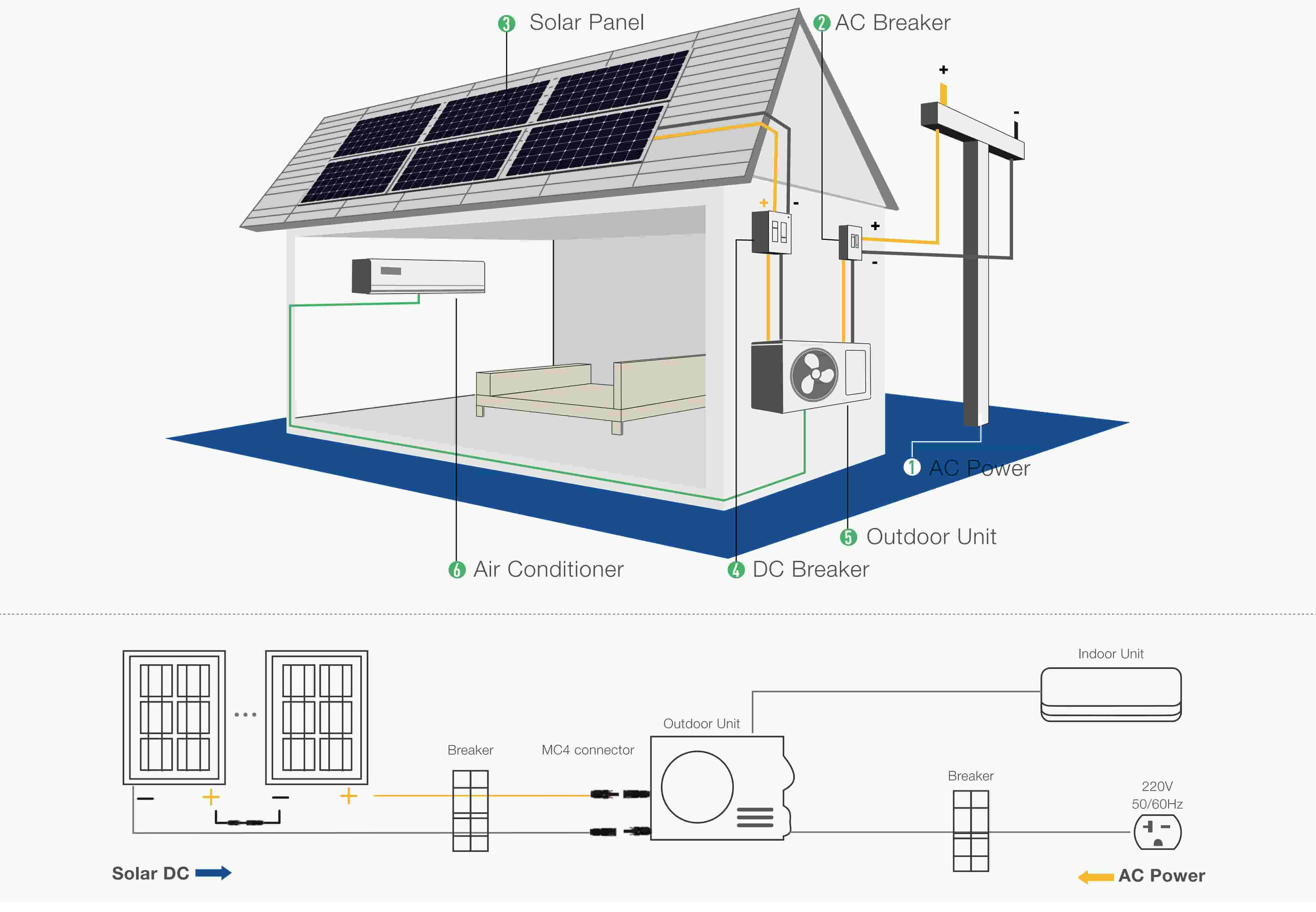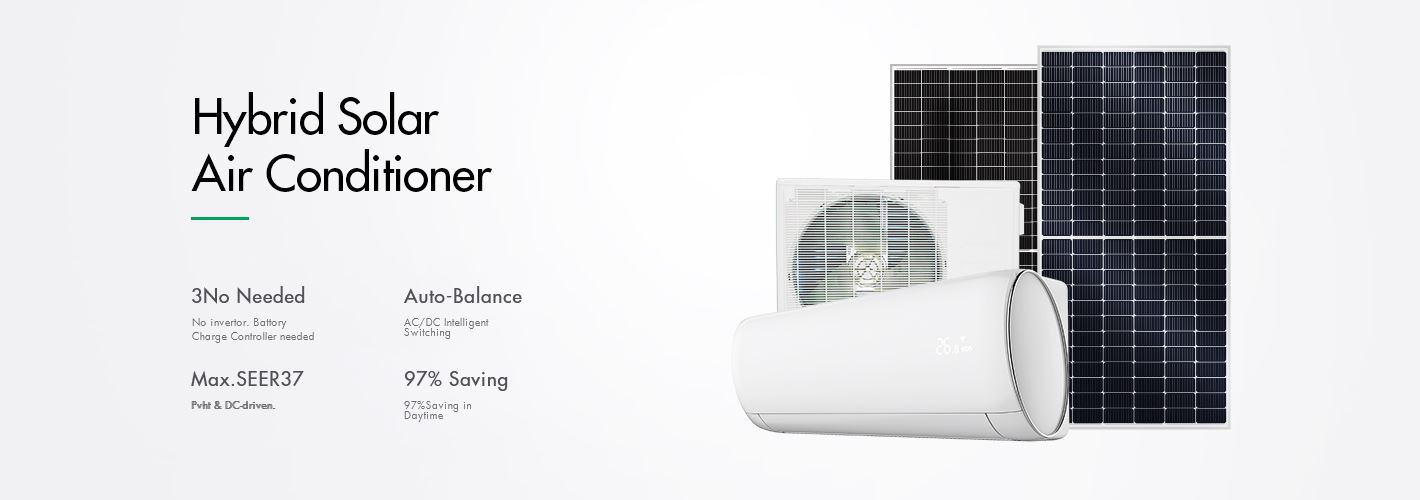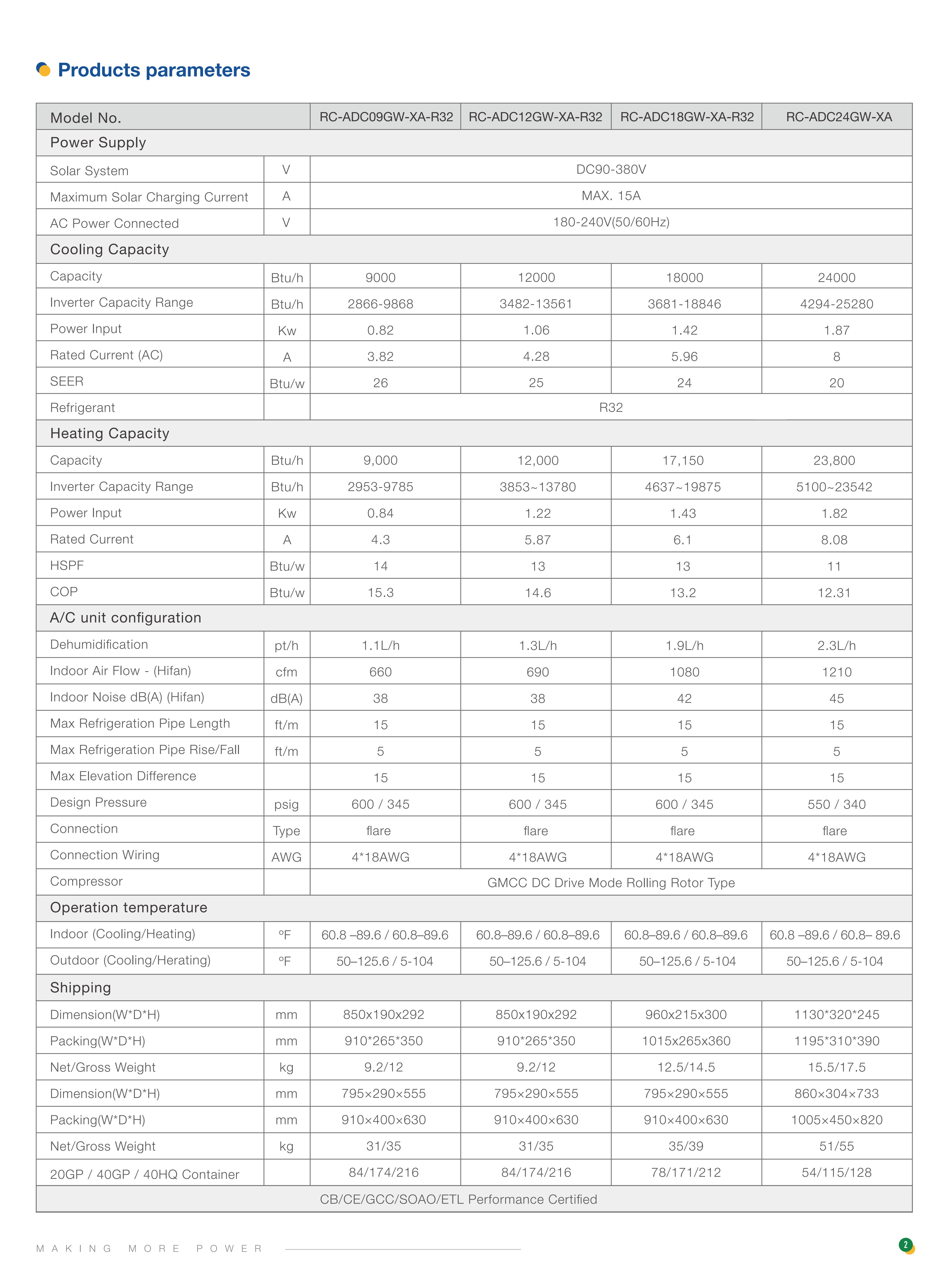It's important to note that solar air conditioners do have limitations. They require adequate sunlight for optimal performance, may require energy storage solutions for nighttime operation, and the initial installation cost can be higher compared to conventional systems. However, for regions with favorable solar conditions and a focus on sustainability, solar-powered air conditioners can be a promising and efficient cooling solution.
Solar panel voltage:
DC90-380VMaximum Solar Charging Current:
15AAC Power Connected:
180-240V(50/60Hz)Refrigerant:
R32Compressor:
GMCC DC Drive Mode Rolling Rotor TypeConnection:
Flare
Solar-powered air conditioners combine the of solar energy with the cooling of traditional air conditioning systems.
Here are some advantages of solar air conditioners
Energy savings: Solar air conditioners utilize renewable energy from the sun, reducing reliance on conventional electricity sources. This can lead to significant cost savings on electricity bills, especially in regions with abundant sunlight.
Environmental friendliness: Solar air conditioners produce clean, renewable energy, reducing carbon emissions and contributing to a greener and more sustainable environment. By utilizing solar power, they help mitigate the negative impacts of fossil fuel-based energy generation on climate change.
Off-grid operation: Solar air conditioners can operate independently of the electrical grid, making them suitable for remote locations, areas with unreliable electricity supply, or during power outages. This provides reliable and uninterrupted cooling even in situations where electricity is limited.
Long-term savings: While the upfront cost of installing a solar air conditioner may be higher compared to traditional systems, the long-term savings in electricity expenses can offset this investment. Over time, the energy savings can result in a positive return on investment (ROI) and reduce the overall lifecycle costs of air conditioning.
Lower peak load on the grid: Air conditioning is a major contributor to peak electricity demand, especially during hot summer days. Solar-powered air conditioners can help reduce the strain on the electrical grid by using solar energy, alleviating stress during peak demand periods and enhancing grid stability.
Scalability and flexibility: Solar air conditioning systems can be designed to fit various scales and requirements, from residential to commercial and industrial applications. They can be integrated into new constructions or retrofitted into existing buildings, providing flexibility for different needs and scenarios.
Government incentives: Many governments and utility companies offer financial incentives, subsidies, and tax benefits to promote the adoption of renewable energy systems, including solar-powered air conditioners. These incentives can further reduce the upfront costs and provide additional savings.

A solar air conditioner, also known as a PV (photovoltaic) powered air conditioner, operates by utilizing solar energy to power its cooling system. Here is an overview of how it works:
Solar panels: The system consists of solar panels, often installed on the roof or an open area with maximum exposure to sunlight. These panels contain photovoltaic cells that convert sunlight into electricity.
Electricity generation: When sunlight hits the solar panels, the photovoltaic cells generate direct current (DC) electricity. The panels are typically connected in an array to produce the desired amount of electricity.
Power conversion: The DC electricity from the solar panels is sent to an inverter, which converts it into alternating current (AC) electricity. AC power is the standard type of electricity used in most homes and appliances.
Air conditioner unit: The AC electricity is then used to power the air conditioner unit. The unit consists of components such as a compressor, condenser, expansion valve, and evaporator, which work together to cool the air.
Cooling process: The air conditioner's compressor pressurizes a refrigerant gas, typically a hydrofluorocarbon (HFC) or hydrochlorofluorocarbon (HCFC), creating a high-temperature, high-pressure gas.
Heat exchange: The hot gas then flows into the condenser, where it releases heat to the surrounding environment. This step transfers the heat from inside the room to the outside.
Expansion and evaporation: The refrigerant, now in a cooler state, passes through an expansion valve, which reduces its pressure. This causes the refrigerant to expand and evaporate, absorbing heat from the indoor air.
Indoor cooling: The cool evaporated refrigerant flows through the evaporator coil, where it collects heat from the room, thereby cooling the air. The cooled air is then circulated back into the indoor space through ducts or fans.
Cycle repetition: The refrigerant, now in a gaseous state, returns to the compressor, and the cycle repeats to maintain the desired cooling effect.

Installing a solar-powered air conditioner requires careful planning and professional expertise. Here is a general overview of the steps involved in the installation process:
Assess your energy needs: Determine the cooling capacity required for your space. This will depend on factors such as the size of the area, insulation, and climate conditions.
Evaluate solar potential: Assess the solar potential of your location. Make sure your installation site receives sufficient sunlight to generate the required energy. Ideally, it should have clear access to sunlight for most of the day.
Calculate energy requirements: Calculate the energy demands of your air conditioner. This involves determining the power rating and electrical consumption of your unit. Consider both the cooling and auxiliary power requirements.
Design the solar system: Work with a solar professional to design the solar energy system. They will consider factors such as the air conditioner's energy needs, the available roof space, and the solar panel capacity required. They will also help determine the appropriate types of solar panels, inverters, batteries, wiring, and mounting structures needed.
Obtain necessary permits: Check with your local authorities to obtain any necessary permits or approvals for installing a solar system. Compliance with building codes and regulations is essential.
Install solar panels: Install the solar panels on a suitable location, such as the roof or ground. Ensure they are properly oriented and tilted for maximum solar exposure. The panels should be securely mounted and wired in accordance with safety standards.
Install supporting components: Install the necessary components for the solar system, including inverters, charge controllers, batteries (if applicable), and the electrical wiring. These components work together to convert and store solar energy for use by the air conditioner.
Connect the air conditioner: Connect the air conditioner unit to the solar system. This may involve integrating with the existing electrical system or installing a separate electrical circuit dedicated to the air conditioner.
Test and commission: Once the installation is complete, test the system to ensure everything is functioning correctly. Verify that the solar panels are generating electricity, the inverters are converting the DC power to AC power, and the air conditioner is receiving power from the solar system.
Monitor and maintain: Regularly monitor the performance of your solar air conditioner and conduct routine maintenance as recommended by the manufacturer. This may include cleaning the solar panels and checking the electrical connections.
It is important to note that the installation process can vary depending on specific factors, such as the type of solar air conditioner, the size of the system, and any local regulations. Working with a qualified solar installer will ensure a safe and efficient installation of your solar air conditioner.
FAQs:
Q1: Do you support OEM/ODM?
A:Definitely, OEM&ODM service is supported with a certain quantity,including customize logo,package and label;
Q2: What's the production time?
A: The production time is normally 15 working days. but we will always prepare some stocks for popular models.
Q3: Can you provide DDP service?
A:Yes, if you are a personal customer and don't want to deal with the customs, we can provide DDP service to your address.
Q4: What about the warranty and how to claim?
A: Warranty period are 5 years since you receive the product, our professional after-sales team will deal with all warranty issues.